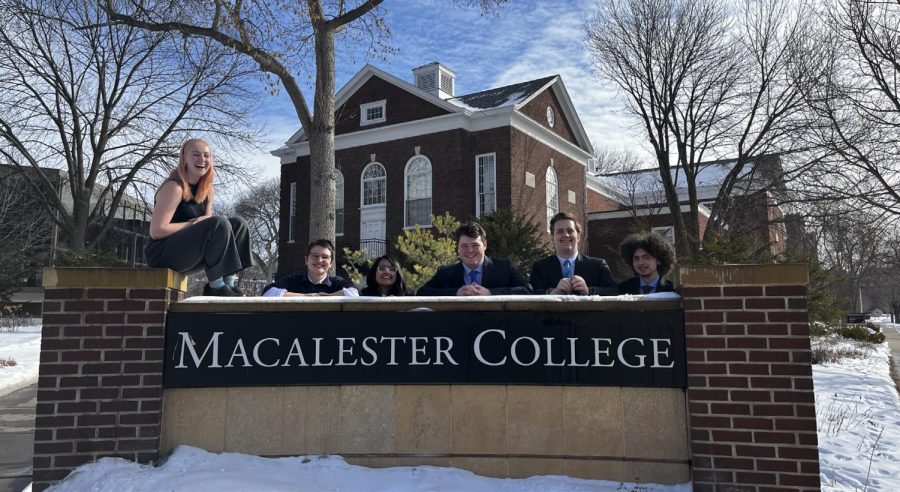Mac Ethics Bowl wins National Competition
The students of the winning Ethics Bowl team. From left to right, Sarah Beth Hobby ’24, Casey Moerer ’23, Dipakshi Sarma ’24, Joe McMurtrey ’22, Paul O’Connell ’22 and Ethan Glass ’25. Photo courtesy of Dipakshi Sarma ’24.
March 10, 2022
This February, Macalester’s Ethics Bowl team won their first annual Intercollegiate Ethics Bowl National Competition. The team was represented by six students who competed against 36 college teams from across the country.
Founded in 2013, Ethics Bowl is part of the Forensics program at Macalester. Unlike speech and debate or mock trial, Ethics Bowl is a philosophical debate in which two teams compete to create the most ethical argument to a case and specific question from a judge. Teams are able to agree with aspects of the other team’s argument and the competition is fostered from solidity of argument and ability to defend the thought processes that lead to the most ethical answer.
In late December, Macalester’s Ethics Bowl team was given a case packet of seventeen cases, all of which they debated and conversed thoroughly in preparation for competition. Despite the intense atmosphere and short timeline between receiving the cases and the competition date, Sarah Beth Hobby ’24, a member of the winning team, said that she loves the team environment in Ethics Bowl.
“The team environment is really light and fun and encouraging of growth. A big part of the program is encouraging people who don’t have a lot of confidence in their public speaking ability to, you know, become more comfortable talking about issues in person, first in small groups, and then in front of the whole team,” said Hobby. “I think that [goal] is definitely reflected in our captains and our leadership.”
Additionally, the cases reach across a large field of topics. Everyone has an area of particular interest that allows them to showcase their knowledge while also learning about something completely outside their comfort zone.
“Personally that’s why I love Ethics Bowl. We cover such a wide variety of topics and there’s going to be something for everyone which I love. It could be anything from research ethics, to you know, environmental considerations to politics, to COVID-19 regulations,” said Ethics Bowl team co-captain Sarah Falkovic, ’22.
Nathan Vinehout Kane ’18 is the Assistant Coach for the Ethics Bowl team and participated in Ethics Bowl when he was a student at Macalester. He and Falkovic both cited generational knowledge from past ethics bowl teams as a component of their success this year. The team has compiled past case discussions and years of technique which has aided them in their current success.
“It’s these little things that the team has done over the years that get passed on from generation to generation and that generational knowledge was really super key,” said Vinehout Kane.
Of course, this win was not without challenges. Ethics Bowl has a strict timeline, which means that effective communication is crucial to success. Team members need to do research on case background and catch up on material from missed meetings in order to ensure competition success. During the competition itself, teams are not allowed to bring any outside notes with them to reference when preparing their arguments. This means that predetermined arguments and trust in every team member is vital.
Another challenge comes from the fact that ethics bowl grasps at deep ethical and philosophical questions. One particularly challenging case centered around a study in which scientists were attempting to insert uteruses and blood transfusions from female rats into male rats to see if male rats could successfully become pregnant.
“What is the value of an animal versus the life of a human? Under what circumstances is it ethical to test on animals? All of these issues are deeply controversial and we all have different areas we agree on, some parts and not others” said Joe McMurtrey ’22. “It’s very challenging because one of the things of ethics bowl, you want to come to a consensus of what you’re going to argue and we’re blessed to have a team of six strong minds each with different opinions. Trying to negotiate between them and come to a consensus is a really fun process.”
Cases can also be humorous. Falkovic explained one case that focused on Birds Aren’t Real, a conspiracy theory that Nixon replaced all the birds with robots programmed to monitor the masses. The case discussion formed around the ethical role of satire in conspiracy theories and the differences between theories like Birds Aren’t Real and QAnon.
“How transparent are [conspiracy theorists] about the accuracy of their information?… We had some really interesting back and forth conversations about that and figuring out the moral distinctions [between] QAnon versus Birds Aren’t Real,” said Vinehout Kane.
This April, the Ethics Bowl team will take on Bioethics Bowl, a competition similar to Ethics Bowl and one in which Macalester is the current defending champion. The team hopes to keep this title as well as grow their program in future years. With the support of new Forensic’s Director, Beau Larson, for whom this was their first year, Falkovic expressed hope for a bright future for Macalester’s ethics bowl team.
“I want to see continued vested interest in the Ethics Bowl program. I’m very excited to see the new directions that our forensics director takes us,” said Falkovic.
“I am incredibly proud of the Ethics Bowl team for their dedication to preparation, rigor and ethical decision-making,” Larsen wrote in an email to the Mac Weekly. “Winning a national championship is a life-long accomplishment!”













